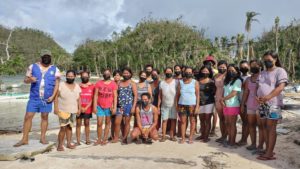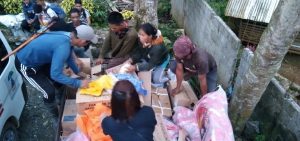The Ecosystems Work for Essential Benefits, Inc. (ECOWEB) and partners call for more community led solutions and better complementation of efforts for rebuilding lives and livelihoods of population heavily affected by the recent flooding and landslides caused by the low-pressure area (LPA) trough in Mindanao that have impacted over 1.2 million individuals and 354,019 families from 768 barangays in the Region XI and Caraga. A landslide in Davao de Oro left 7 people dead and 100 others missing. Despite minimal media coverage which attention has focused more in Davao region, the severe effects of the LPA trough are clearly evident in Agusan del Sur and Agusan del Norte, where homes, farms, and livelihoods lie submerged. A total of 358,775 individuals and 85,224 families are affected in Agusan del Sur while Agusan del Norte and Butuan City have 18,755 individuals and 5,100 families affected.
The Municipality of Las Nieves, recognized as Agusan Norte’s food basket, has witnessed extensive damage, with 14 out of its 23 barangays affected. This catastrophe has crippled agricultural lands, disrupting local supplies and endangering the livelihoods of residents. In Barangay Ambacon alone, more than 100 hectares of farmland, hosting rice, banana, corn, vegetables, and root crops, have been submerged for nearly two weeks, spanning over 20 kilometers. Even the Agusan marsh communities in Agusan del Sur, typically presumed resilient to flooding due to its annual occurrence, have succumbed to this year’s extreme events, with floodwaters reaching the third floor of stilt houses. Two weeks before the LPA trough, a shearline phenomenon had already saturated the soil of the affected area with water due to days of heavy rains.
In response to this crisis, ECOWEB, Inc., in collaboration with local civil society organizations and government agencies, has taken proactive steps to address urgent needs and initiate community-led humanitarian response and early recovery efforts. Under the leadership of Executive Director Regina “Nanette” Antequisa, the ECOWEB response team, along with local partners including members of the Community-led Empowering Action for Resilience Network (CLEARNet) in the region such as PASAKK and Save Mindanao Volunteers and members of the National Anti-Poverty Commission Victims of Disaster and Calamities Sectoral (NAPC-VDC) Council, has been actively involved in conducting an appreciative inquiry process. Four teams are covering different affected municipalities in Agusan del Sur in the conversations applying appreciative inquiry approach that foster community actions and reinforce the spirit of mutual assistance and support.
The community conversations that immediate concern of the affected is not just about food, shelter, and water access but also about restoring livelihoods, especially for farmers, fisherfolk, and daily wage earners. Many affected individuals rely solely on farming, fishing, and labor for their sustenance. Conversations with the response team have highlighted the pressing need for financial support, access to resources, and replacement of essential tools and equipment.
The plight of the affected communities underscores the profound impact of the LPA trough on poverty levels, exacerbating the vulnerabilities faced by already marginalized groups. Despite the relief assistance received, it falls short of addressing the magnitude of the crisis. Sustained support from both humanitarian organizations and government agencies is imperative as these communities navigate the path to recovery.
Collaboration between response organizations, local government units, and stakeholders is paramount. ECOWEB, through its partnership with LGUs, is spearheading community planning processes to identify and strengthen the existing capacities and address the most pressing needs of vulnerable groups. However, comprehensive recovery requires enhanced government programming and support, bridging the gap between immediate relief and long-term resilience-building efforts.
Being the usual first responders, self-help initiatives within affected communities are happening, showcasing the resilience and solidarity of affected people in times of adversity. The partnership agreement with Las Nieves LGU provides potential model for effective coordination and implementation of recovery initiatives, emphasizing the importance of community-driven solutions.
As we look towards rebuilding and recovery, it is incumbent upon all stakeholders to prioritize the needs of the most vulnerable, ensuring sustainable solutions that foster resilience in the face of future disasters. The community-led response action by ECOWEB and local partners with support from Help – Hilfe zur Selbsthilfe, Legatum Limited Foundation and Vitol Foundation currently covers the municipalities of La Paz, Loreto, Bunawan, and Trento in Agusan del Sur, Butuan City and Las Nieves in Agusan del Norte. ECOWEB in partnership with Help, NCIP and other agencies, is also implementing a 2 year development project in the Indigenous communities of La Paz and Loreto for the protection of their rights, enhancing their climate resilience and sustainable development of their ancestral domain.
By joining hands and working together, we can pave the way for building resilient future for Mindanao especially of more vulnerable communities to climate risks and emergencies. Your support and action are crucial in helping communities rebuild their lives and livelihoods amidst adversity. Together, we can make a difference. ECOWEB welcomes your support.



![Read more about the article Fuerte de la Concepcion y del Triunfo or Fort of the [Immaculate] Conception and of the Triumph [of the Cross]](https://ecowebph.org/wp-content/uploads/2008/07/123123-1-300x222.jpg)